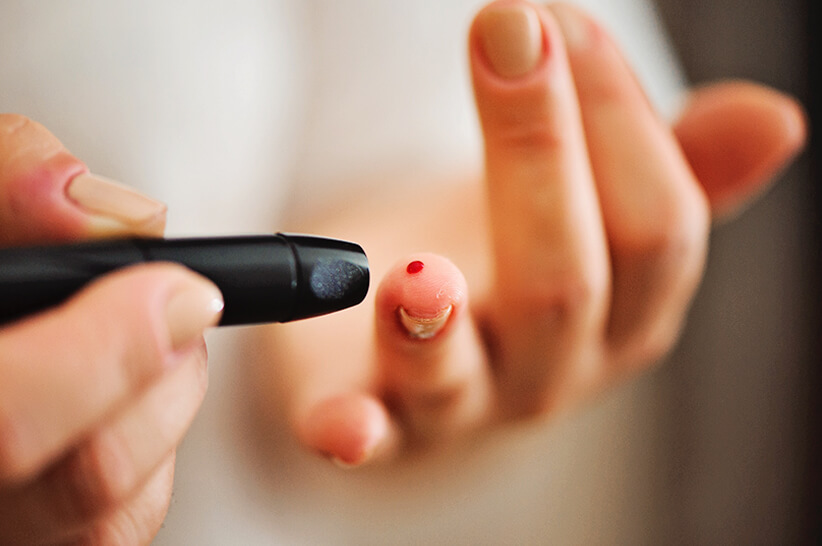Do you ever find yourself up in the middle of the night, eating alone by the glow of the refrigerator light? Or perhaps you eat little very little throughout the day, only to overeat in the evening hours?
Many people struggle with eating late at night; if this sounds familiar, you could have Night Eating Syndrome. In this article, we’ll explain what Night Eating Syndrome is, its causes, signs and symptoms, its secondary health effects and how to overcome and seek help for this condition.
What Is Night Eating Syndrome?
Night Eating Syndrome (NES) is a condition that results in eating a large amount (25% or greater) of a person’s total calories in the evening and night hours, as well as frequent waking in the middle of the night in order to eat. One of the important diagnostic criteria for NES is that the individual is fully aware that they’re eating, unlike a different sleep disorder that results in night eating without awareness. NES can also result in sleep disturbance and insomnia.
While NES isn’t officially recognized in the current edition of the Diagnostic and Statistical Manual of Mental Disorders (DSM-5), it falls under the category of Other Specified Feeding or Eating Disorders (OSFED). Other diagnoses that fall under the OSFED categories include low-frequency or limited duration binge eating and bulimia, as well as atypical anorexia nervosa, which differs from typical anorexia in that the individual may be not be considered underweight. 1
What Causes Night Eating Syndrome?
While there isn’t one exact known cause for developing NES, there are several factors that could play a role in the development of this eating disorder, such as:
Stress
High levels of stress cause the body to release several hormones that have a direct impact on appetite, such as cortisol. Studies have found that people who are constantly stressed tend to have higher levels of cortisol, which is a predictor of future weight gain due to an increased desire for food, especially highly palatable, high-fat foods. 2
Mood disorders
Many people find that they crave food when they’re feeling sad, anxious, stressed, or any other negative mood. Many high-glycemic foods, such as foods containing sugar, increase the availability of an amino acid called tryptophan. Tryptophan is converted into serotonin, which is often called a “happiness hormone” because it has an effect on mood. 3 Therefore, people with a history of anxiety or depression may be more likely to suffer from NES in an effort to increase levels of serotonin through eating. 4
Under-eating throughout the day
When a person’s caloric intake is very low throughout the day, they may tend to over-compensate by eating late into the evening and night hours. This can also result from a highly restrictive, unsustainable diet and the person “gives in” at the end of the day due to hunger and then may feel guilty for going off their diet.
Working shift work
If a person is used to eating more at night because they’re used to working night shift, they may have a difficult time getting back to a more normal pattern of eating and crave food in the nighttime hours.
Sleep deprivation

Photo by Shutterstock.com
Sleep deprivation alters ghrelin and leptin, two important hormones influencing hunger and fullness. Leptin helps create a feeling of satiety after eating while ghrelin increases appetite and hunger. Studies have found that sleep deprivation is associated with an increase in ghrelin (hunger) and reduced levels of leptin (fullness), which leads to overeating and weight gain. 5
Night Eating Syndrome Signs and Symptoms
There are several diagnostic criteria for NES, and several of the common signs and symptoms need to be met in order to receive a NES diagnosis. According to the International Journal of Eating Disorders, the following must be present in order to diagnose NES: 6
- A pattern of significantly higher food intake in the evening and night hours, as evidenced by either:
- At least 25% of the person’s daily food intake is consumed after the evening meal.
- Waking up at least two nights per week in order to eat.
- The person is fully aware that they are eating in the evening or in the middle of the night. Again, NES is different than another sleep disorder that results in night eating that the person is unaware of called Sleep-Related Eating Disorder.
- The person can identify with at least three of the following:
- Lack of desire to eat or appetite in the morning for at four or more mornings per week.
- A strong desire to eat between the last meal and bedtime and/or during the night.
- Insomnia, or having a difficult time falling or staying asleep, occurs four or more nights per week.
- Feeling like eating is necessary in order to either fall asleep or return to sleep after waking at night.
- Often having a depressed mood or having a mood that worsens in the evening.
- The person feels significant stress or has an impaired level of functioning.
- The disordered eating pattern has been present for at least three months.
- The disordered eating is not a result of substance abuse or dependence, a medical disorder, medication or another underlying psychiatric disorder.
The person suffering from night eating syndrome is fully aware that they are eating in the evening or in the middle of the night.
Furthermore, other signs of night eating disorder include: 7
- Eating in secret, due to shame or guilt.
- Eating even when the person isn’t hungry.
- Eating past the point of comfortable fullness.
- Feeling like the person is out of control when it comes to their eating habits.
- Negative body image.
How Does Night Eating Syndrome Affect Your Health?
Some studies have found that NES is associated with overweight and obesity, though it’s unclear if NES is a result of obesity or a causing factor of it. People with NES tend to eat twice as many carbohydrates and protein and four times as much as fat compared to those without NES. 8 If calories eaten at night are in excess of the person’s caloric needs, the result is weight gain.

People with NES tend to have more disrupted sleep, which can take a toll on overall health. In fact, people with sleeping difficulties are more likely to develop type 2 diabetes. According to the National Sleep Foundation, those who get between 4 and 6 hours of sleep per night are at increased risk of developing diabetes. Sleep deprivation can cause increased hunger hormones (as previously mentioned) as well as reduced insulin levels while sleeping. When insulin levels are reduced, more sugar accumulates in the bloodstream, which can lead to the development of diabetes. 9 Also, people who are more tired from a poor night’s sleep may be less likely to want to exercise, and a sedentary lifestyle is a risk factor for developing diabetes.
Researchers have even found a connection between sleep deprivation and cholesterol levels. Sleep-deprivation tends to cause negative changes in cholesterol, such as the increase of LDL or “bad” cholesterol and lowering of HDL or “good” cholesterol. Having high LDL cholesterol and low HDL cholesterol are risk factors for developing cardiovascular disease, which includes heart attack and stroke. 10 If the nighttime eater is eating food in excess of their daily nutritional needs, particularly in the form of high-fat or high-sugar foods, those excess calories can be stored as triglycerides, or fat in the blood. High triglyceride levels have also been associated with increased risk of cardiovascular disease and even inflammation of the pancreas. 11
5 Tips to Overcome Night Eating Syndrome
While NES can cause negative emotional and health outcomes, there are ways to help overcome it. Like other eating disorders, it takes time, patience, consistency and support to change disordered eating patterns Some tips to help overcome NES on your own include:
1. Eat consistently throughout the day
Providing your body with enough nourishment consistently throughout the day may help reduce nighttime cravings. If you skip meals or under-eat, you’re more likely to compensate for it later in the day.
2. Practice sustainable eating habits
Chronic dieters may be more prone to NES because they under-eat and deprive themselves of food they enjoy, or they feel guilty when eating around other people. Choose an eating pattern that you feel is more of a lifestyle change than a fad diet, and you’re more likely to stick with it.
3. Stay hydrated

Photo by Shutterstock.com
Drinking enough fluids, preferably water, throughout the day can help increase your feeling of satiety and reduce cravings. If you’re feeling the urge to snack and don’t physically feel hungry, drinking a glass of water can help lessen the urge to eat more than you really need.
4. Practice good sleep hygiene
Many of us are guilty of not practicing good sleep hygiene, which can lead to sleeping difficulties and possibly NES. The National Sleep Foundation suggests:
- Limiting daytime naps to 30 minutes.
- Avoiding caffeine and nicotine close to bedtime.
- Exercising during the day while avoiding strenuous exercise close to bedtime.
- Establishing a relaxing sleep routine, such as taking a warm bath, reading a book or doing light stretches. Try to avoid emotionally upsetting conversations prior to bedtime.
- Creating a healthy sleep environment by avoiding screens (TV, cellphone, etc.), having a temperature between 60-67 degrees, using white noise machines, or using blackout curtains or shades. 12
5. Choose the right bedtime snack
If you do want a light snack before bedtime, there is some scientific evidence that dairy products, fruits and vegetables may provide sleep-promoting effects. 13

When Should I See a Doctor?
If you’ve been struggling with the symptoms of NES for awhile, the tips above haven’t helped, and it’s negatively impacting your physical and/or emotional health, it may be time to have a visit with your healthcare provider. You may be referred to a mental health counselor for cognitive behavioral therapy (CBT), or you may be prescribed an antidepressant. 14 Because NES can negatively impact your health, it’s important to take the next step and pursue help, and know that the condition is treatable.
Conclusion
While the occasional “midnight snack” likely won’t be harmful to your health, consistently eating a large majority of your daily calories after dinner and in the middle of the night can negatively impact health. Night eating syndrome is linked with poor quality sleep, which is a risk factor for developing chronic diseases such as diabetes and heart disease. If you feel like you might have NES, using the tips provided is a good step in the right direction towards treatment. It’s best to consult with your healthcare provider to get an official diagnosis and to receive any additional treatment necessary if you’ve been having an ongoing struggle with NES.
Takeaways
- Night eating syndrome (NES) is considered an eating disorder that may negatively affect health over time due to disrupted sleeping patterns.
- There are many criteria that need to be met for an official NES diagnosis, but some signs and symptoms include eating a large majority of total daily calories after the last meal of the day and frequent waking up in the middle of the night to eat.
- Some possible causes of NES include restrictive eating, stress, and other mental health conditions.
- While NES can be self-treated, medical intervention in the form of cognitive behavioral therapy and/or antidepressants may also be helpful.










![Juicing for Weight Loss: Everything You Need to Know [Plus Recipes]](/wp-content/uploads/2019/08/Juicing-for-Weight-featured-image.jpg)








